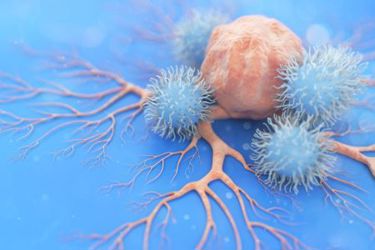Harnessing The Power Of the Innate Immune System In Cancer Research
By Sarah Cooley and Kyle Jensen, Sanofi

The advent of immunotherapies created a paradigm shift in oncology that has improved the outlook for people with many types of cancer. Immune checkpoint inhibitors, for instance, have revolutionized care in select solid tumors, improving outcomes by providing more personalized therapy and easing the treatment burden for patients.1
But while immunotherapies have transformed the cancer treatment landscape, the benefits have thus far been limited to a small number of patients with specific disease biologies or tumor types. Some patients with difficult-to-treat cancers have few, if any, options beyond transplant or chemotherapy-based regimens. Others may have an initial response only to become non-responsive or resistant to their treatment down the line.
This is particularly true for hematologic malignancies, such as acute myeloid leukemia (AML), where many immunotherapies have been ineffective. CAR T cell therapies have shown promise in this area but have yet to produce meaningful success, with questions around side effects and access barriers.
Ultimately, there is a profound need for novel treatment strategies to overcome these barriers and bring the potential of immuno-science to more patients. In pursuit of new solutions, researchers have turned their attention to the innate immune system.
Leveraging The Body’s First Line Of Defense
The first modern immunotherapies were primarily centered around adaptive immune mechanisms, activating T cells in the body to detect cancer and generate an antitumor response. But as our understanding of the tumor microenvironment has expanded, it’s become apparent that many tumors have the ability to evolve mechanisms, such as loss of major histocompatibility complex (MHC) expression, to evade T cell-based approaches, rendering a patient resistant or non-responsive to treatment.2
The adaptive immune system, however, is only one side of the coin. The innate immune system, the body’s first line of defense, contains its own set of specialized cells, such as neutrophils, macrophages, and natural killer (NK) cells, which may have utility in cancer treatment.2
NK cells, in particular, have emerged as a potentially promising avenue for researchers. NK cells are potent cytotoxic lymphocytes, naturally made in the bone marrow, that have a unique ability to distinguish healthy cells from abnormal ones and destroy the latter, hence the name. They produce direct effector functions against their cellular targets, while also helping to create, guide, and maintain the body’s immune response.2
NK cells are uniquely endowed to address cancers that have evolved mechanisms to evade T cell recognition, one of the most common causes of immunotherapy resistance.2 They do not require antigen-specific priming in order to recognize cancerous cells3 and early preclinical studies have exhibited the ability to halt metastases of certain cancers by putting these cells in a dormant state.4 Furthermore, NK cells also can help prime the adaptive immune system to respond against cancer cells, suggesting potential utility in synergistic combination approaches.5 Additional research is needed.
Additionally, in contrast to CAR T cell therapies, which use T cells harvested from the cancer patient, NK cells can be obtained from healthy donors and expanded ex vivo, potentially allowing for the development of an accessible, off-the-shelf cell-based therapy.2 Further, separate from events required for T cell activation, NK cell activation is governed by the interaction of NK receptors with target cells, independent of antigen processing and presentation.3
It should be noted that research into this mechanism is still early and is not without challenges we’re working to overcome, particularly surrounding the difficulty meeting clinical-grade ex vivo expansion, limited in vivo persistence, limited infiltration to solid tumors, and tumor editing to evade NK cell activity. Researchers are exploring various strategies to overcome these challenges, such as ex vivo preconditioning with cytokines and/or small molecular drugs, engineering an “off-the-shelf” or iPSC-differentiated chimeric antigen receptor (CAR)-NK.
Despite the challenges, there remains enormous promise in harnessing NK cells to fight cancer. Over the past decade, the scientific community has produced several investigational monoclonal antibody therapies and cell-based therapies leveraging NK cells that have shown promise in early-stage clinical trials. Among these, our team is particularly excited about NK cell engagers (NKCEs), a novel class of multifunctional biologics, which have emerged as an exciting innate immune-based mechanism in oncology research.
The Potential Advantages Of NK Cell Engagers
NKCEs essentially work by bridging NK and tumor cells as a means of redirecting and targeting the endogenous NK cells’ antitumor properties. Through this mechanism, NKCEs can theoretically be more effective in boosting endogenous NK cell cytotoxicity compared to other NK cell-based approaches.
While NKCEs have potential application across various tumor types, this mechanism has particular promise for hematologic malignancies and could one day serve as an additional immunotherapy option for patients. In particular, they could be used in conjunction with current standard of care regimens, including allogeneic transplant.2 Additional research in this area is needed.
While there are hurdles to overcome and much additional research to be completed, the early-stage data supports the ongoing evaluation of NKCEs. At the American Society of Hematology annual meeting in December 2023, first-in-human data evaluating a NKCE in patients with refractory or relapsed AML indicated the potential of this investigational treatment for patients. The final readout of data was recently presented at the European Hematology Association annual congress in June 2024 and a Phase 2 study is underway.
In totality, the literature to date reinforces the clear promise in leveraging the qualities of NKCEs to activate the innate immune system for cancer treatment. We look forward to advancing the development of these innovative medicines, both alone and in combination with other approaches, as well as exploring other NK-focused mechanisms across hematologic malignancies where there remains a great unmet need for new treatments.
References
- Shiravand Y, Khodadadi F, Kashani SMA, et al. Immune Checkpoint Inhibitors in Cancer Therapy. Curr Oncol. 2022;29(5):3044-3060. doi:10.3390/curroncol29050247
- Vivier E, Rebuffet L, Narni-Mancinelli E, Cornen S, Igarashi RY, Fantin VR. Natural killer cell therapies. Nature. 2024;626(8000):727-736. doi:10.1038/s41586-023-06945-1
- Portale F, Di Mitri D. NK Cells in Cancer: Mechanisms of Dysfunction and Therapeutic Potential. Int J Mol Sci. 2023;24(11):9521. doi:10.3390/ijms24119521
- Correia AL, Guimaraes JC, Auf der Maur P, et al. Hepatic stellate cells suppress NK cell-sustained breast cancer dormancy. Nature. 2021;594(7864):566-571. doi:10.1038/s41586-021-03614-z
- Shaver, K. A., Croom-Perez, T. J., & Copik, A. J. (2021). Natural Killer Cells: The Linchpin for Successful Cancer Immunotherapy. Frontiers in immunology, 12, 679117. https://doi.org/10.3389/fimmu.2021.679117
About The Authors:
 Kyle Jensen has 20+ years of oncology research experience and currently serves as the global project lead for acute myeloid leukemia (AML) at Sanofi. Prior to joining Sanofi, Jensen was senior director of clinical development at Kiadis, leading the development of their universal donor allogeneic NK cell program. Leading up to that role, he guided medical affairs at Iovance Biotherapeutics. He has held additional leading roles in medical affairs while at Karyopharm, TG Therapeutics, and Millennium/Takeda Oncology, supporting multiple hematologic and solid tumor indications across a number of products. He holds a Ph.D. in pharmaceutical sciences from the University of the Pacific’s Thomas J. Long School of Pharmacy, along with an MS in clinical research in conjunction with a pediatric oncology fellowship from the University of Minnesota, an MBA in management from Rockhurst University, and a BS from Graceland University.
Kyle Jensen has 20+ years of oncology research experience and currently serves as the global project lead for acute myeloid leukemia (AML) at Sanofi. Prior to joining Sanofi, Jensen was senior director of clinical development at Kiadis, leading the development of their universal donor allogeneic NK cell program. Leading up to that role, he guided medical affairs at Iovance Biotherapeutics. He has held additional leading roles in medical affairs while at Karyopharm, TG Therapeutics, and Millennium/Takeda Oncology, supporting multiple hematologic and solid tumor indications across a number of products. He holds a Ph.D. in pharmaceutical sciences from the University of the Pacific’s Thomas J. Long School of Pharmacy, along with an MS in clinical research in conjunction with a pediatric oncology fellowship from the University of Minnesota, an MBA in management from Rockhurst University, and a BS from Graceland University.
 Sarah Cooley, MD, MS, joined Sanofi as senior global project head, hematologic oncology, in 2023. Previously, she held the role of senior vice president, clinical translation, at Fate Therapeutics and was responsible for leading translational medicine across the company’s cell-based cancer immunotherapy programs and for early clinical development of NK cell product candidates. She brings more than 15 years of leadership in the field of NK cell clinical research and development, having most recently served as associate professor of medicine in the Division of Hematology, Oncology and Transplantation at the University of Minnesota. At the University of Minnesota’s Masonic Cancer Center, she served as the medical director for the Clinical Trials Office, for the Oncology Informatics Shared Resource, and most recently as the director of Investigator Initiated Research and of the Cancer Research Translational Initiative. Cooley received an undergraduate degree in biology and chemistry from Cornell University and graduated from the University of Minnesota Medical School. She completed a residency in internal medicine at the University of California, San Francisco, and fellowship training in hematology and oncology at the University of Minnesota, where she also received her MS in clinical research from the School of Public Health.
Sarah Cooley, MD, MS, joined Sanofi as senior global project head, hematologic oncology, in 2023. Previously, she held the role of senior vice president, clinical translation, at Fate Therapeutics and was responsible for leading translational medicine across the company’s cell-based cancer immunotherapy programs and for early clinical development of NK cell product candidates. She brings more than 15 years of leadership in the field of NK cell clinical research and development, having most recently served as associate professor of medicine in the Division of Hematology, Oncology and Transplantation at the University of Minnesota. At the University of Minnesota’s Masonic Cancer Center, she served as the medical director for the Clinical Trials Office, for the Oncology Informatics Shared Resource, and most recently as the director of Investigator Initiated Research and of the Cancer Research Translational Initiative. Cooley received an undergraduate degree in biology and chemistry from Cornell University and graduated from the University of Minnesota Medical School. She completed a residency in internal medicine at the University of California, San Francisco, and fellowship training in hematology and oncology at the University of Minnesota, where she also received her MS in clinical research from the School of Public Health.
